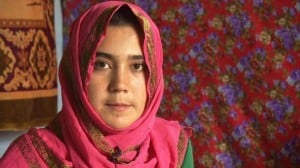Yesterday was International Women’s Day, and (almost) every media outlet covered “something” on women in the week leading up to it, as that is the “thing to do” on Women’s Day after all. Not all stories were very newsworthy, and many other topics I covered already recently. As such, I have left many of these articles out, but I might have missed an interesting item here or there, so feel free to add any in the comments!
A controversial family law has passed in Iran; most temporary marriages do not have to be registered. The situation of women and the offspring of these unions is a great concern of women activists.
In Dagestan, a “black widow” has bombed herself in front of a police station, killing five police officers and injuring others. The woman is identified as the widow of an Islamist militant, who was killed earlier this year.
The conflict at the Southern border of Thailand has resulted to a constant presence of government troops in the predominantly Muslim area. Over the cause of the years, around 1,000 Muslim women involved with (Buddhist) troops or other officials have been abandoned. Other problems have arisen with the placement of troops in the area as well, such as the two soldiers who have been detained this week as they recorded a sex act with a underage Muslim girl. An army official has called it a “romantic liason”; others call it rape. The local (Muslim) community is hurt, wants the army base out and the soldiers punished to the max.
Womensenews.org featured an interview with the Turkish author of The Angels of Tehran, Rabia Kazan, who is trying to publish her book in English. The book chronicles her trip to Iran and the reshaping of her perspective on Islam.
Ibtisam Mara’ana, Palestinian film director, reflects on her mother and the role she played in her family. As she was always the “man of the house,” her daughter would now refer to her as a feminist.
From April 30 onwards, Muslim women in New South Wales, Australia will have to uncover their faces in order to identify themselves.
For many poor Tajik families, marrying off their (underage) girls is a way to cut costs. These marriages are often not legally registered, which makes it hard for the wife to claim child support or alimony in case of divorce.
The February 23, 1991 mass rape in the village of Kunan Poshpora in Indian Kashmir still haunts the villagers until the day of today; children are being taunted in schools, some women have been unable to conceive ever since and it is impossible for the villagers to marry outside the village, because of the ordeal they went through. May Allah give them justice and ease their suffering!
Ten (innocent) women have been kidnapped in Southern Somalia by Al-Shabaab. The residents of the area are extremely worried about the whereabouts of the women.
An Uighur mother of a trafficking victim says she was illegally placed in custody after petitioning officials about her son’s case.
The position of Afghan women is getting even more difficult: last week a conservative Islamic council urged for a strict application of the Islamic law in a statement that was welcomed by president Hamid Karzai. When asked to comment, many Afghan “field experts” are not too worried.
An Al Arabiya piece suggests that setting quotas for women in Arab government would actually be a good suggestion, as the female participation, even (or especially) after the Arab Spring, is marginal.
Thousands of Mauritanian women were expected to march through the streets of Nouakchott on March 8 demanding the enforcement of laws, which protect women from gender-based violence and harmful traditional practices, such as female genital mutilation (FGM) and forced feeding. This demonstration by women is a first for Mauritania.
Around fifty women got injured at a demonstration at a Saudi university, the women were angry about bad management, rubbish and the lack of basic facilities for women.
In the Indian town of Mumbra, a poetry workshop among young Muslim women in 2010 by Iranian American poet Roxy Azari has still has influence on the women in the community today.
Al-Akhbar features an article on three Lebanese women, who are in “different” relationships than what society might expect. One of them lives with her boyfriend, without a marriage contract; the other woman lives away from husband, in order to keep their relationship working; and the last woman has a temporary (mutah) marriage contract.
Azerbaijani journalist Khadija Ismailova received a serious threat, blackmailing her to “behave,” and she went immediately public, claiming that she will not be stopped. The situation of journalists in the country has been called “dire” by the human rights group Freedom House; in recent years several journalists have been killed.
On International Women’s Day Egyptian women will march to deliver a list of demands to parliament, which is at the moment 98% male.
DJ Zeyna is 19, just graduated and the first professional female DJ in Senegal.
Eurasia.net features a photo-essay on the women of the Kist community in Georgia, who are ethnic Chechens and predominantly Muslim. The lack of jobs and educational opportunities in the Pankisi Gorge, where the community lives, is particularly hard on the women.
Women activists in Iraq are lobbying to create a tougher law when it comes to “honor killings.” At the moment, the sentences in cases that concern “honor killings” are often very light.
An increasing number of Central Asian women escape the dire situation of their home countries, in order to try to make it as illegal immigrants in Russia.
The search for the widow of the 7 July London bomber Samantha Lewthwaite continues; she is now believed to be in Somalia, where she has allegedly has ties with Al-Qaida related groups. The wife of another suspect in the same case, Jermaine Grant, claims she was just married for a day to Jermaine and does not know anything about the “terrorist activities” of Jermaine, and Samantha.
Zarifa Qazizadah is the only female village head in Afghanistan, and a mother of 15. For her work, she has received 18 awards from the Afghan government.
Topless Iranian women “say no to political Islam.”
Women’s groups in Lebanon are furious about the appointment of national “Alphabet Day” on March 8. According to a government official, the law has been approved by the all 128 Lebanese MP (four of them female) and, after all, “The first teachers are mothers, since they teach alphabet skills to their children.” It has become clear, yet again, why International Women’s Day is so very necessary……
According to a research among young Muslim women in Australia, these young women are finding their voice in the community.
The Globe and Mail featured a series of photos by Iranian photographer Kiana Hayeri on the life of young women in Iran.













